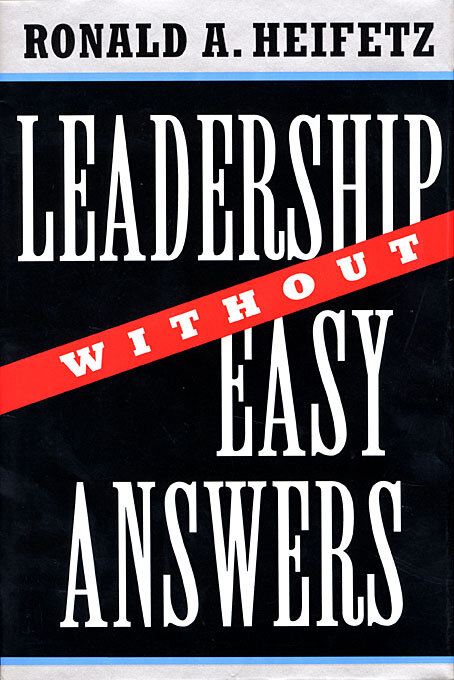Ronald A. Heifetz, Leadership Without Easy Answers. Harvard University Presss, 1998.
Referenced in:
- Adaptive Leadership
- Empowering Leadership
- Overcoming Change Resistance, Creating Change Receptiveness
- Leading Change and Transition in Churches
- Transformational Leadership
LifeandLeadership.com Summary
In this work, Heifetz coins the term “adaptive leadership,” which is an excellent example of transformational and empowering leadership.
Heifetz is a Harvard instructor and business consultant who bases his book on over 12 years of research among leaders and managers across many sectors. While not addressed to congregations, he makes four major contributions that are helpful to church leadership.
First is the idea that effective leaders must tolerate ambiguity and uncertainty. Ambiguity arises when three conditions are present: 1) novelty – a completely new situation in which there are no familiar cues, 2) complexity – a situation in which there are numerous factors to be taken into account, and 3) a contradictory situation in which different factors suggest different solutions.
Second is his distinction between two types of problems, “technical” and “adaptive.” Technical leadership is that which has clear goals, proven current technology to accomplish the goals, experts available to skillfully use the technology, and narrowly confined constituencies to judge whether the goals have been met. By contrast, adaptive challenges arise when the problem cannot be solved with current knowledge and skills and when the problem itself challenges the validity of our existing beliefs and values.
Third is the role of anxiety in adaptive work. In adaptive situations, anxiety increases as people are forced to take on new roles, new relationships, new values, new behaviors, and new approaches to work. The leader must not focus on reducing anxiety, but upon mission, keeping stress high enough to challenge people but not so high as to be immobilized.
Fourth is two forms of authority: formal and informal. Formal authority is the power of appointed office. Informal authority, the stronger currency, is the power to influence people beyond compliance through the leader’s trustworthiness, ability, and civility. Churches today face many anxiety-producing adaptive challenges riddled with ambiguity relative to beliefs and practice. Heifetz’ principles and strategies enjoy wide use among many Christian leadership coaches, consultants, and practitioners.
From the Publisher
Ronald A. Heifetz, professor at the John F. Kennedy School of Government, presents clear, concrete strategies for anyone who needs to take charge – no matter what the organizational conditions. Drawing on a dozen years of research among business leaders and politicians, Heifetz demonstrates what one must do—and avoid doing—to be a leader in an age without easy answers.
About the Author
Ronald Heifetz directs the Leadership Education Project at the John F. Kennedy School of Government, Harvard University.
***For additional information on this resource, including reviews, click the bookstore links. Check the reference at page top or the links below for resource guides on related topics.***
Related Areas
See Other Resources on Leadership:
See Resources on Over 100 Areas of Ministry Leadership:


